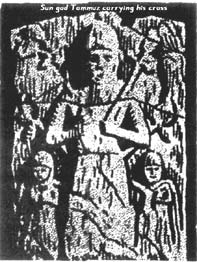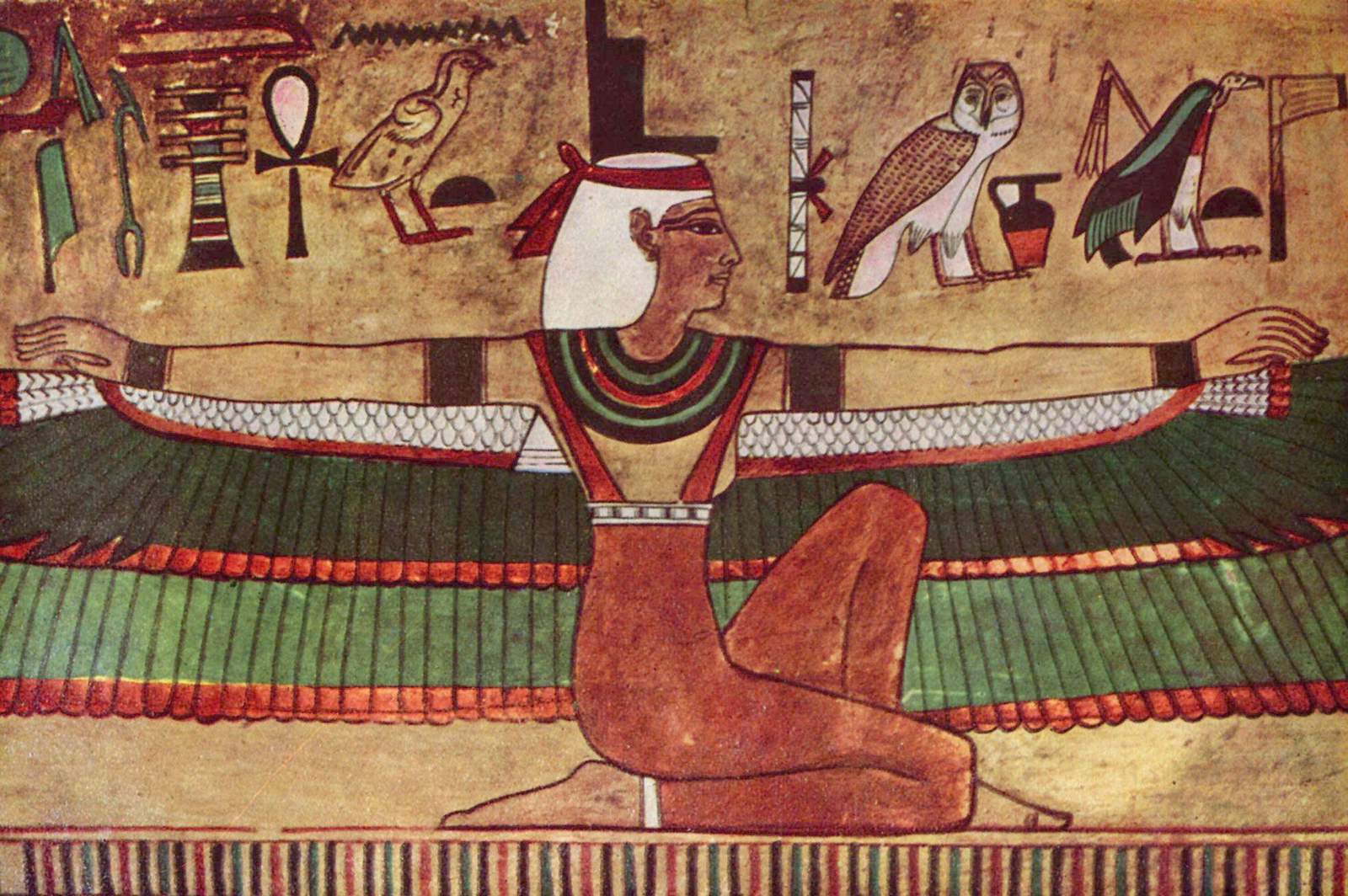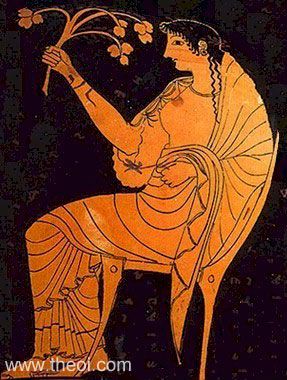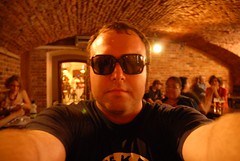Following the weekend's heavy selections from Morocco and Algiers I went for the 7-10 split down the middle. There was a double header of two documentaries, the First from Iraq and the second from Iraq & Palestine/Israel. Lets take one at a time and in the order that I saw them, as impression and perception build ontop of one another.
 The Blood of My Brother
The Blood of My BrotherThis piece opens up at the grave of Ra'ad. His younger brother Ibrahim is trying to lead his grieving mother away from the tomb of her deceased eldest son. The back story here is how Ra'ad died: he was shot by accident while guarding a holy shrine in Baghdad. He and a group of other devout men had taken up positions and rotating patrols around a very holy Mosque in Kadhimiya. A passing American patrol mistook him and openned fire. He was killed on the spot. He was unarmed.
This much of the film is pure narrative and doesn't take long in understanding that the killing of Ra'ad is a terrible burden. Similarly to the other two films, which featured absent patriarchs, and male sons that have assumed the role of patriarch and head of the household, Ibrahim is thrust into taking charge of his family and his brother's photography shop at a relatively juvenile age. His brother, Ra'ad, was something of a local legend. He had saved his money to open a photography studio and was well respected and known. The family boasts that 7,000 people show up for his funeral, the death of a Martyr. This is where the details get a little murky.
Now Ra'ad didn't die in an operation, or in the heat of battle, or in the fray of "once more unto the breach", he died guarding a holy Mosque. He is given the same glory as that of one who takes up arms for Jihad, he is deemed a Martyr. The scenes of his funeral are fantastic. People are carrying his image through the streets, his coffin on their shoulders and screaming and decrying his status as a holy Martyr, "Allah is great!" they chant as his corpse travels to the graveyard. It seems that Martyrdom can be bestowed on anyone deemed to be engaged in a socially accepted right action, one that furthers the locally sanctioned ideology, or socio-political intent. Martyrdom is the promse at the end of the road of misery and that of something, which on Iraqi later interview, describes "with my feeble brain I can't do it justice, but its a place not like Earth, with clean water, fresh fruit and maidens."
Ibrahim is a pretty central character in all of this. He has responsibility beyond his capacity while simultaneously coping with the death of his older brother who filled the void of his father. He says that he's ultimately not upset, he's happy that Ra'ad died in the manner that he did and that his family is happy to bury a Martyr for the cause. Which cause, we're not too sure. The neighborhood and Mosque are loyal supporters of the Mehdi Army and Moqtada Al-Sadr, so did he die supporting Moqtada? Did he die as a patriot for his country? Was Ra'ad's death more cloely associated to that of a crusading knight in defense of his small patch of holy land? The easy answer here is all of the above. Death, from what you begin to realize, is a public right and a private virtue. The death of a martyr is a personal honor, while the cause and intent of the death, after death, the life after death, becomes a matter of usurpation. Whoever wants to view that the death was joyous, or that it was in defense of something, or that it was needless, can coopt the martyr's victory, oh yes, lets not get this wrong, it is a victory of sorts, once the tears are gone there is nothing but absolute adoration for the way that Ra'ad died. Is this, like Octavio Paz wrote in Labrynth of Solitude, a people in love with Death? In Paz's pachuco world death is rebirth in the form of Dio De Los Muertos, Death is a positive of sorts and an absolute necessity to understand the solitude of a people that don't have a true sense of their own identity. Are we to think then that Iraqi's only understand themselves as Muslims, in the extreme certainly, as Arabs when they are surrounded by Martyrs and have the opportunity for the same? There's one thing that really makes me curious, how many martyrs were there in the days of Sadaam? Was everyone that perished in his prison, considered in their time and during their death, a martyr?
The documentary, at times, exercises restraint. When the family is being interviewed there are definite cautious approaches by the film makers in the sense of leaving no trace. You don't know they are there, Ibrahim and his family simply talk to the camera. I say this now because its definately not the case in the next film. However, there are other large stretches of the documentary that seem to be "out of place." I'm not sure I needed to see the incursions by Bradley Fighting vehicles and frenzies of people scurrying, and a helicopter shot down, to truly understand this film, and what to me is the story of a family. Was there not enough material, not enough quotidian footage with which to construct how a family grieves? The scenes of the US Military, shake cameras where the cinematographers are running as gunfire erupts, seems like it was meant for another documentary. We understand, they are not grieving in a vaccum, Iraq is happening now as I write this.
Still there's one thing that I find telling, and eye popping, but not surprising. Ibrahim, in one of his candid moments looks at the camera and says "I don't hate Americans, but if when I saw an American or Jew I just want to kill him." Did you get that? His brother was killed by a US Soldier, as to the soldier's religious background its anyone's guess. However, the institutionalized hatred of Jews, a link between the US occupation, the Iraqi struggle against the occupation, a mentality of insurgency is balled up in that one phrase. It's as if Ibrahim's anger at Ra'ad's death is so abundant that he has to lump the Jews in or the whole of America wouldn't be sufficient to account for his brother's slaying. I once heard an interview with an Arab scholar who spoke about the Israeli/Palestinian conflict, he was Lebonese, and he said "the problem is that they [palestinians] hate the Jews more than they love Palestine." I think Thomas Friedman might have said something similar except he directed it to suicide bombers and changed Palestine to "children". Its not enough to hate just your brother's killer, why is that? Was it that the other hatred was there before? Its a curious statement and can be taken many ways. One thing is certain, this is not just one juvenile's outlook, or how he's lashing out at the unjust murder of his brother, this is an instituional hatred. Does this mean that every Iraqi, or lets just go for the unpopular stance here, every Arab hates the Jews and wishes them destroyed along with the Americans?!
No, not in the least! As a matter of fact, this is what I would consider somewhat fringe, and just as there are all manner of people in this world, so are there religious ideologies with which to lead and mislead. If its one thing that this film maker, I think, wants to show us, is that its not only easy, but socially acceptable and even proper to join the resistance in Iraq from the standpoint of social acceptance, fraternity and for religion. The chants of Allah, and the fiery sermons of Sheikh al-Kadhimi in the Mosque interchange with "Allah is great" "There is only one True God" "Moqtada is Great." When politics and religion melt together with "T"ruth pinned down down and indisputably defined both politically and religiously, the outcome can be just as frightening as the complete abolishment of religion in lieu of totalitarian nationalism.
Its not at all the most comfortable film to watch, a lamb is slaughtered similarly to how the cow was slaughtered in
Bled Number One, and it leaves you feeling a little queezy from the gitgo. But when you see the hundreds and thousands of men jumping and chanting, that you're dealing with something so powerful, religion, that you're living in the medieval ages and Sala'adin is near. Yes, a powerful film that has its flaws, is sensational at times, propogandist and definately somewhat one-sided, but important to see.
 I Know I'm Not Alone
I Know I'm Not AloneI have to give credit to the organizers of the festival: the juxtaposition of this film with the preeceding one was perfect. We move from an extremely violent and visceral portrayal of life in Iraq under the occupation as spectators caught between armored fighting vehicles and masked gunmen, to a man and his guitar and a bag of jah love trying to make sense of something that granted is confusing, but he's ill prepared to make a movie out of.
Michael Franti, the musician, goes to Iraq to try and understand the quagmire of the occupation. He sets out to meet and speak with locals, artists, writers and of course, as he puts it "especially musicians." As far as I'm concerned, this film absolutely fails as a documentary. You are constantly aware of of Franti, this isn't as much about the people as it is about Franti and his guitar, and frnakly, for the most part he comes of like a bafoon and completely out of his element.
Franti arrives in Iraq and decides to visit "dangerous places" with the help of his Iraqi driver to meet local people and talk to them. Here's where the challenge begins: trying to forget that Franti is there. But you can't! His music, and clips of him sitting like Val Kilmer sans a bottle of whiskey, at a Mike and recording his thougts by candle light, are interspersed between shots of him walking the streets of Iraq and later Palestine.
Some of the personalities interviewed are fascinating, I think the cab driver was a god send to them. However, as far as access goes, or having any real commentary or insight into the situation, Franti is a complete failure. At one point he decides that he wants to write a song in Arabic but makes the sober realization that he'll never be able to do it, so "I decided if I could write a song with one Arabic word in it, that it might break down some barriers." Oh yes, he does this, and the word of the day, ladies and gentlemen, is "Habibi". Habibi has several meanings, a plethora of them actually, and meaning changes with context and emotion. I'm very thankful to my friend Michelle who was at the movies. She's of Lebonese and Egyptian decent and found the Habibi song just as ridiculous as I did. The song features franti playing the same two chords and chanting Ha-bee-beee over and over again. According to Michelle, Habibi could mean "my dearlin" or "loved one" or "dear friend" or a few other things. After speaking a while we decided that Franti's use of Habibi completely devalues the rich cultural place that this term holds. The audience laughed with a kind of glee at the first rendition of this song. By the third or fourth time there wasn't so much as a chuckle in the audience.
Lets try and look past this, the film moves without any real direction, aimlessly through the streets, as he seeks out writers, a Christian family that tells them about their experience of living 11 days in their basement during the bombing. How dangerous it is to walk the streets and that to go to church you take a cab, to get back you take a cab, but who has money for a cab? You learn that under Saadam, the cab driver, a former school teacher, earned 1 us dollar a month, about 3,000 dinars. This is well below the UN poverty line, things haven't improved since those days except that things cost more and are in shorter supply. There are small illuminating facts, and moments of occasional levity as Franti takes you to meet a heavy/death/punk metal band in Baghdad called the black scorpions that talk about their love of noise and jam in what must be the equivalent of a sonic death chamber. You're introduced to their guitar teacher, that according to Franti, has taught pretty much all the guitar players in Baghdad. One of the members of the Black Scorpoins tells of their early days und Saadam, their teacher told them that they had to write a song for Saadam. They resisted, but then went ahead and did it. You never hear the song, but you learn quite clearly why it was important, because if they didn't "you might disappear behind the sun."
This is all well and good, and then there are the parts that I can't tollerate. Franti goes into a hospital, which is difficult to watch, you see the innocent victims of the conflict and occupation, children missing libms, burns, their faces caught in an expression of innocence tinged with knowledge that no child's eyes should ever have: horror. The images are frozen and a series of stills scrolls past the screen to remind you the viewer not to miss this, but let it soak in. Doing so decontexualizes them and turns them into a late night infomercial for the CCF. You're stomach turns and gets mad at the film makers for trying to juxtapose light hearted banter in the cafes, the constant kissing of people who meet Franti, and then this. It seems out of place, as if the film makers and franti haven't earned the right to show you this and make it stick because they spent more time on ridiculous scenes in Baghdad's first radio station with a loud mouthed US Army Seargent who thinks he's Adrian Cronauer.
After other ridiculous antics in and around Baghdad Franti and his crew depart for Palestine. He says that after seeing a country under occupation, he wants to visit a place that has been occupied for three generations. He arrives in a small Palestinian village on the boarder, on the green line, at the security wall. The village is in a very agriculturaly fertile region of the Levant. What begins is a rather simplified and very one sided explanation of the formation of the state of Israel, the green-line and the 1967 war. He tries to compress 60 someodd years of complicated political history in about 20 seconds. He then goes about interviewing people, again, meeting musicians, former Israeli soldiers, current Israeli soldiers and Palestinians and getting them to talk to one another, in what is the climax of the film. He brings villagers to the gate and has them speak to 2 Israeli soldiers. The conversation is meaningless for the most part. It is not something htat leaves you hopefull because you come to realize that not every Palestinian is a suicide bomber, and every Israeli hell bent on wipping out the Palestinians and loves to serve in the IDF. You already knew this, and you know that when that gate is locked nothing will have changed, and the only reason it was openned was for spectacle and a self serving belief in one-love. Well Mr. Franti, the 60s are over, and we are not that dimb-witted. Really, I swear to you, even if we are left of the middle, it doesn't mean we're less educated because we aren't "that left".
Everything about the Palestine sections of the film are painfully obvious. There's nothing really illuminating in the discussions, that range from a former IDF soldier who is disgusted with what he had to do, but did it, to admissions of other former soldiers who say "we treat them like shit." Well there's truth to that too. You are shown a first hand glimpse of the arduos Gaza border crossing, which is somewhat intriguing to see the abundant checkpoints and hoops that one must jump through in order to cross from here to there, it is not a place you want to be, that is for certain. The Palestinian Rappers are a much needed break from the film's attempt at education. As long as he sticks to culture and avoids politics, which is impossible in this region, then its tollerable.
Now that I've finished ripping it to shreds let me highlight a few of the good points. He does a good thing, he interacts with a people that desperately need to smile. Now if they're smilling because he's a tall man with a guitar and money is unclear, but they are smilling and he is doing that Patch Adams kind of work in a place where I think laughter can easily become an extraterrestial emotion. Franti does show a few fringe groups and peoples that you will never see elsewhere, this is really the only way he could make a movie, he has no expeirence in anything else, and its really his sweet spot. Don't want this film expecting to see a good documentary, or a documentary at all. Watch it because you need to be fed something you already know but this time with a soundtrack.
Coming up tomorrow...
Occupation 101 (Palestine)another documentary, and if I can handle a double header
Seeds of Doubt (Egyptian/German) feature film.





























